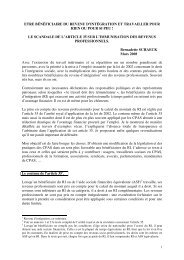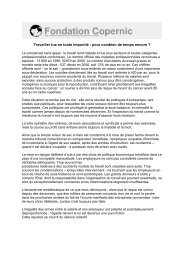Awra Amba RJ 300612 EN - Contacter un comité local d'Attac
Awra Amba RJ 300612 EN - Contacter un comité local d'Attac
Awra Amba RJ 300612 EN - Contacter un comité local d'Attac
Create successful ePaper yourself
Turn your PDF publications into a flip-book with our unique Google optimized e-Paper software.
<strong>Awra</strong> <strong>Amba</strong>, a current experiment of utopian socialism<br />
(later in life he learned to sign and write a few words, but is <strong>un</strong>able to read a newspaper or a book),<br />
the episodes he reco<strong>un</strong>ts were the source of his inspiration. From the age of four, he allegedly (we<br />
are sceptical) started wondering about the <strong>un</strong>fairness of the gender inequality, the maltreatment of<br />
the elderly, labour exploitation, cruel p<strong>un</strong>ishment of children, and dishonest dealings among people.<br />
When he was a child, nobody can answer properly his questions on the reasons of such behaviours.<br />
His extraordinary behaviour being considered abnormal, his family and his neighbours considered<br />
him not surprisingly to be mentally ill, not only because of his support of equality between men and<br />
women but also because of his opposition to institutionalized religion, in a very religious, traditional<br />
and patriarchal Ethiopian society (Habtamu, 2009; Me09/32).<br />
"When I was child, I was furious about what I saw aro<strong>un</strong>d me," says Zumra Nuru. "I fo<strong>un</strong>d it <strong>un</strong>fair<br />
that while my mother helped my father to sow and harvest, he never helped her in the home. I swore<br />
to myself that I would change things when grew up" (France 24, 2009). "My both parents spent the<br />
whole day in the farm but when they came back home, it was time for my father to rest but never for<br />
my mother. After she has been through the same tiring day as my father, she had to do everything at<br />
home. She was expected to cook, clean the house, wash my father’s feet with warm water and serve<br />
the traditional meal. On the top of that, when my mother could not do all that on time, my father<br />
abused, insulted and sometimes beat her. I just wondered why this had to happen to my mother, as if<br />
she had extra strength or something. But I realized later that this was not an isolated event that only<br />
happened in our house, rather it was happening in all families" (France 24, 2009; Habtamu, 2009;<br />
Me09/31).<br />
He still remembers today one of the first times he questioned the established rules, when his mother<br />
accused him of eating Christian meat at their Christian neighbours. Zumra asked her why he was not<br />
allowed to eat meat while the meat was similar to the meat they have at home. She answered,<br />
“Muslims are not allowed to eat Christian meat and vice-versa”, snatched the meat from him and<br />
gave it to the chicken. He was not at all satisfied with the arguments of his mother and went on to ask<br />
questions: why, how, when and from where does come this difference in food, since we are all<br />
human beings and the meat comes from our animals (Halpern, 2007; Ya08/63; Habtamu, 2009)?<br />
At 13, preoccupied by the <strong>un</strong>fair distribution of household duties and responsibilities between<br />
husbands and wives and between brothers and sisters (Me09/31), he was more or less thrown out of<br />
his family house (Crespo, 2011). Yassin (2008/63) thinks it is the age when Zumra developed his<br />
ideas after <strong>un</strong>derstanding the negative impacts of the traditional culture. He lived during five years in<br />
different places of Amhara region: Debre Markos (Gojam), Simada (South Gondar), Sedie Muja<br />
(Gayent, South Gondar), Feres Bete (Gojam), in the Fogera and Dera woredas (South Gondar),<br />
Belessa (North Gondar) and Dessie (Wollo), therefore within a distance of 250 km from <strong>Awra</strong><br />
<strong>Amba</strong>. He was mainly weaver and helped the poor. "I travelled to find people who would accept my<br />
ideas", he said (Halpern, 2007; Habtamu, 2009).<br />
At the age of 18, therefore in 1964, he came back to the village of his parents and asked his family to<br />
arrange marriage for him (Ya08/66). That's the way he married Zeyda (or Zubayeda acc. to Ya08/66)<br />
Muhammad, with whom he lived more than thirty years in happiness according to At05/29.<br />
Nevertheless, a representative of the comm<strong>un</strong>ity said us the first four wives of Zumra had divorced<br />
before a year, mainly because his circle considered him abnormal; Crespo (2012) confirms his first<br />
wife Zeyda divorced for this reason. According to this same source, Zumra would have married<br />
again Nane, with whom he still lives (Question 2 in Annex).<br />
Like the other yo<strong>un</strong>g men of the area, he was farmer and had to help his family (At05/29). At 19, a<br />
quarrel arose with his immediate family members, since he used his income for helping the poor and<br />
the elderly in the village (Me09/33). He became a wandering preacher of his own ideals, travelling<br />
for sharing his ideas and finding supporters. During the dry season, he went to the neighbouring<br />
villages of Yesho Michael, Shimie Mariam or Kechin-Wonz Kidane-Mihret to spread his message of<br />
brotherhood, respect for women, protection of children as well as special care for the aged and the<br />
20 / 85

















